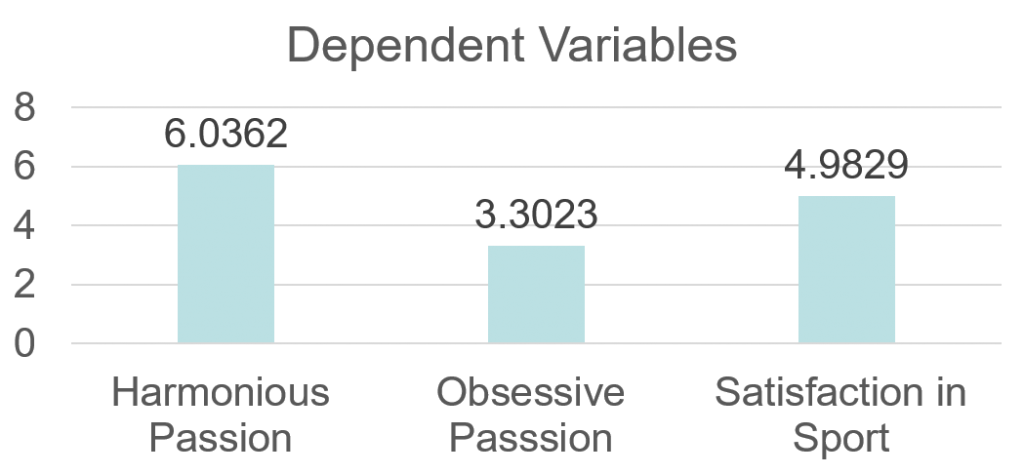Nolan Garabo & Dr. Eric Martin

Introduction
There are various types of coaching behaviors in sport. Different types of behaviors of a coach might predict an athlete’s passion and satisfaction in sport. The various coaching behaviors can be spontaneous, or in response to a performance mistake, and include:
- Reinforcement
- Nonreinforcement
- General Technical Instruction
- Mistake Contingent Encouragement
- Punishment
- Technical Explanation plus Punishment
- Ignoring a Mistake
Passion in sport can be defined as the strong inclination toward an activity that individuals like (or even love), that they value, and which they invest time and energy (Mageau et. al, 2009). There are two types of passion:
- Harmonious passion – strong, yet controllable, desire to engage in a certain activity or sport, due to an autonomous internalization of behavioral regulations
- Obsessive passion – uncontrollable compulsion to engage in a certain activity or sport, due to a controlled internalization of the activity. Typically, obsessive passion has led to a variety of negative outcomes for participants
Another variable that might be influenced by coach feedback, and often correlated with sport passion, is satisfaction in sport. Satisfaction in sport is based on an athlete’s perception of social support in sport (Gabana, et. al, 2017).
Both athlete passion and satisfaction in sport could be impacted by the type of feedback athletes perceive from their coach and deserves further examination.
Research Question: Does coaching feedback predict harmonious passion, obsessive passion, and satisfaction in sport in Division 1 athletes?
Participants/Methods
- 258 Division I student-athletes participated in this study (73 freshmen, 64 sophomores, 67 juniors, and 54 seniors)
- 73 of the participants were male, while 189 were female, 92 participants’ fathers played collegiate sport, and 55 of the participants’ mothers played in college.
- Around 71% of the participants were on at least a partial scholarship.
- Participants were from a number of sports
- Participants completed a demographics questionnaire, the Coaching Feedback Questionnaire, the Passion Scale, and the Satisfaction in Sport Questionnaire
- Data Collection took 15 minutes total
Results
Coaching Feedback

- Reinforce: 3.7741
- Non-Reinforce: 2.1731
- Reinforce + Tech: 3.2625
- Mistake Cont Encourage: 3.2587
- Ignore Mistakes: 2.2046
- Teach for Mistakes: 3.0656
- Punishment: 1.8707
- Tech + Punishment: 2.3147
Dependent Variables

- Harmonious Passion: 6.0362
- Obsessive Passion: 3.3023
- Satisfaction in Sport: 4.9829
Multivariate Multiple Regression
The Multivariate Multiple Regression was significant with two canonical correlation functions. In the first function, coaching feedback explained 11.5% of the variance in the dependent variables, and the second function explained an additional 2.28% of the variance.
| Multivariate Multiple Regression | Function 1 | Function 2 |
|---|---|---|
| Reinforcement | 0.81 | 0.2 |
| Non-Reinforcement | -0.11 | -0.85 |
| Technical Reinforcement | 0.7 | 0.1 |
| Mistake-Contingent Encouragement | 0.65 | 0.33 |
| Ignoring Mistakes | -0.12 | -0.66 |
| Technical Explanation of Mistakes | 0.13 | -0.13 |
| Punishment | 0 | -0.48 |
| Technical Explanation Plus Punishment | 0.16 | -0.49 |
| Harmonious Passion | 0.84 | 0.4 |
| Obsessive Passion | 0.7 | -0.71 |
| Satisfaction in Sport | 0.77 | 0.33 |
Key Takeaways
- Athletes more frequently perceived positive coaching behaviors than negative coaching behaviors.
- Athletes reported very high levels of harmonious passion, moderately high satisfaction in sport, and low levels of obsessive passion.
- Positive coaching behaviors were related to harmonious passion and satisfaction in sport.
- Negative coaching behaviors were related to obsessive passion but were not related to satisfaction in sport and harmonious passion.
Discussion
- Athletes notice a coach’s behavior, and a coach’s behavior can have both positive and negative effects on an athlete’s experience in sport.
- Positive coaching behaviors was positively related to high levels of satisfaction in sport and harmonious passion for the athlete.
- When athletes perceived negative behaviors, athletes had lower levels of harmonious passion and satisfaction in sport, and higher levels of obsessive passion.
- Coaches should attempt to positively reinforce athletes, provide technical reinforcement, and encourage athletes after mistakes. They should refrain from ignoring mistakes, punishments, and nonreinforcement in their coaching behaviors.
Additional Information
For questions or comments about this research, contact Nolan Garabo at nolangarabo@u.boisestate.edu.